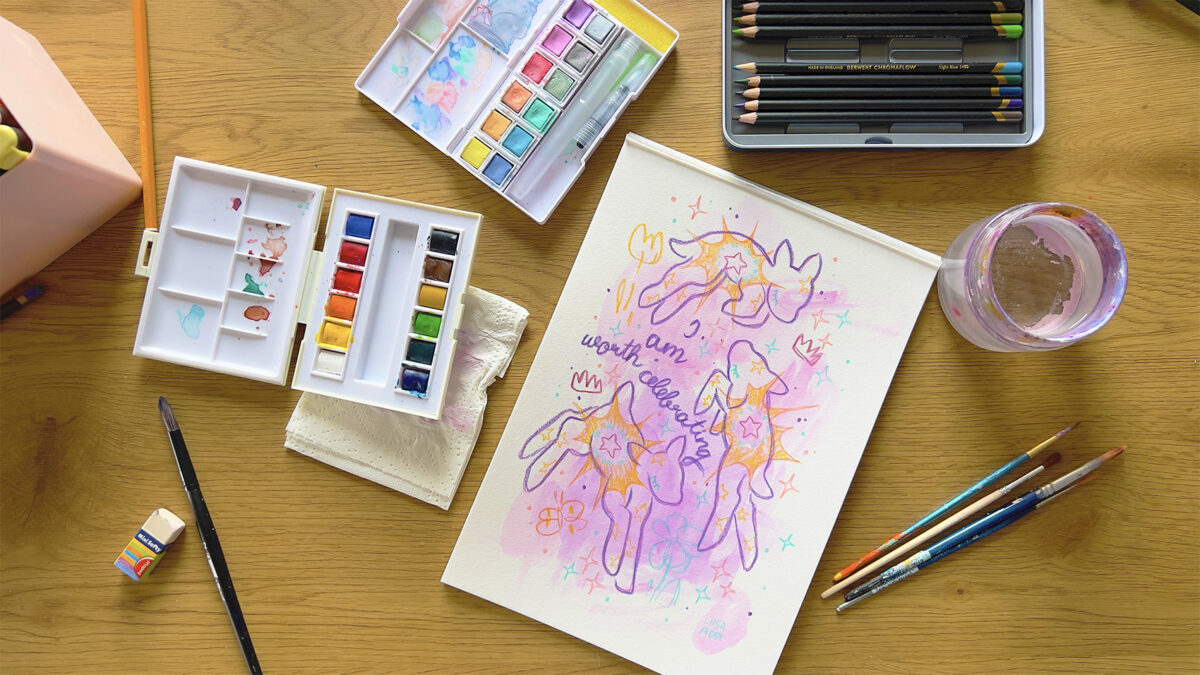Yesterday was an important day! I started my morning with a lovely sunny walk with Waffel through the forest and parks, thinking about how grateful I am—grateful that I’m already celebrating the second anniversary of getting my diagnosis! Yes, it’s been two years since I officially received my autism and ADHD diagnosis, and so much has changed in my life because of it—mentally and in everything around me. What a privilege it is to exist, to get to know myself, and to have the right tools for all of it!

So, what has changed the most?
- I no longer feel ashamed of how much I need to rest. Yes, ADHD would like to do more things, but I no longer feel ashamed if I burn out. Spending 3 days in bed in total darkness watching my favorite shows? No problem. The world keeps turning. To-do lists never run out and won’t escape me. A slower pace of life calms the nerves and brings joy.
- I’ve designed my life and home to suit my needs—not the other way around. My whole life, I’ve tried to mold myself to others’ expectations, but that’s a destructive path of self-abandoment.. My life, my design, my rules, my needs. I clean and create systems at home to make daily life easier—not to add more stress on top.
- I don’t “people-please” anymore. I call people-pleasing something else now: self-abandonment. Self-abandonment was a survival tool in childhood—it served a purpose. But as an adult, I no longer need it, because it leads to burnout and poor relationships. I’ve realized that the more I get to know myself, the better I understand my needs, and in turn, I can communicate them to others. And then, people who respect me as I am appear in my life. That leads to good relationships. Life in bloom!
Many people still don’t understand why these diagnoses are needed, thinking they’re just labels and limiting. Nope, it’s the opposite: a diagnosis is not a label, it’s a suitcase full of the right tools.
When your vision gets worse.. do you also decide not to go to the doctor, fearing they make it worse? You go, not because they’ll worsen your sight, but because you’ll get a diagnosis (presbyopia or myopia) and receive glasses. Those glasses are tools that suddenly improve your quality of life. They don’t limit you—they help. The same goes for autism, ADHD (and personality disorder) diagnoses. Suddenly, you gain a bunch of ways to improve your life.

What saddens me deeply is when I hear that parents don’t want to help their children get a proper diagnosis, fearing it will limit their opportunities. In reality, you’re the one limiting your child’s opportunities if you don’t give them glasses for poor vision. They won’t magically start seeing better just by trying harder. And it’s the same for different neurotypes: the more proper tools a child gets, the more trauma-free their development, the healthier their self-esteem and skill set.
At the same time, I totally understand where these fears come from. The “lovely” Soviet Union did everything to erase people with physical and mental disabilities from sight. They repeatedly claimed there were no disabled people, but the truth was grim: people were hidden away at home, in institutions, or simply… “eliminated.”
In many cases, having a disability added a note to your record that made it hard to get a job or hold important positions. When the Soviet Union collapsed, the fear didn’t—despite the horrors ending. Rumors persisted: that you’ll never get out of the “crazy-house” once admitted, that jobs will be harder to find because of a “secret mark,” and other nonsense continued to float around society. But none of that is true anymore. Quite the opposite: there’s increasing recognition on a national level of the importance of disability support, mental health care, and new systems.

Those people who still say “what nonsense, there were no mental issues in the past”—oh, there were. And how. The solution was chronic alcoholism and public shaming. Another big change? Research. Women weren’t diagnosed in the past because they weren’t studied. Since 2019, women have been increasingly researched for autism and ADHD, but still over 95% of studies have been conducted on white men. It’s hard to get a diagnosis for something people don’t know about. This isn’t a “trendy disease”—it’s finally information spreading. And that’s fantastic!
The increasing visibility of people with disabilities shows a healthy, developing society. And those afraid that disabled people “take things away” from others—again, the exact opposite: every development made for people with special needs has also benefited “regular” people. Elevators, escalators, logical building layouts, food delivery, digital document signing (without leaving home)—these are all essential for disabled people and wonderfully convenient for everyone else.
And I must really emphasize this: people with disabilities are one of the only minority groups that anyone can become a part of at any moment. And most people likely will, eventually (sorry—aging awaits us all). That’s why I’m always surprised when people oppose making the world more disability-friendly. A world friendly to disabilities makes life more beautiful for everyone!
